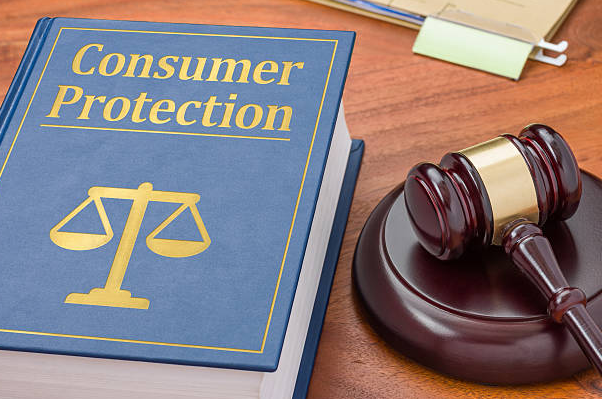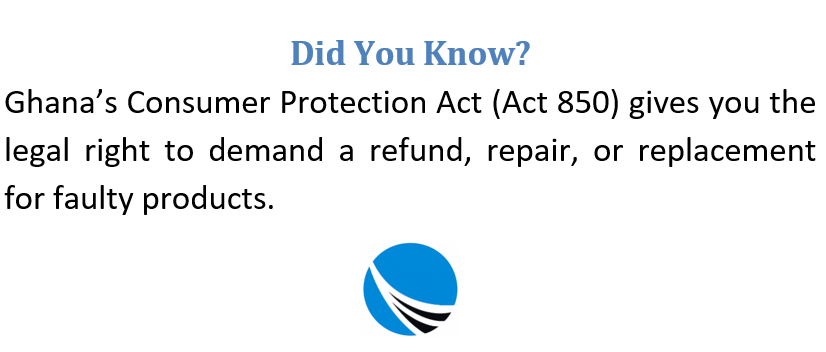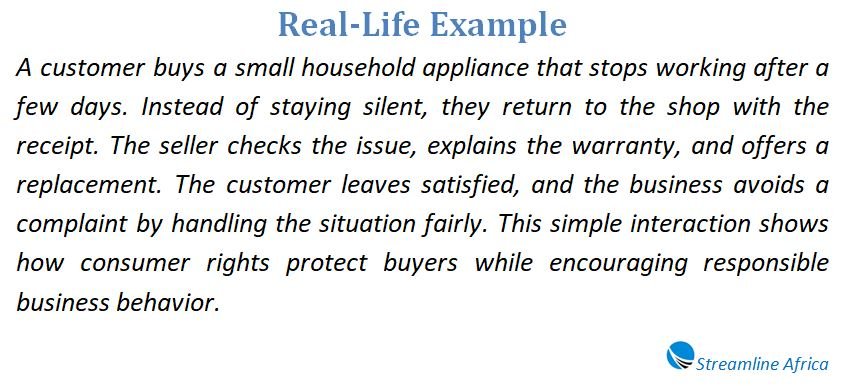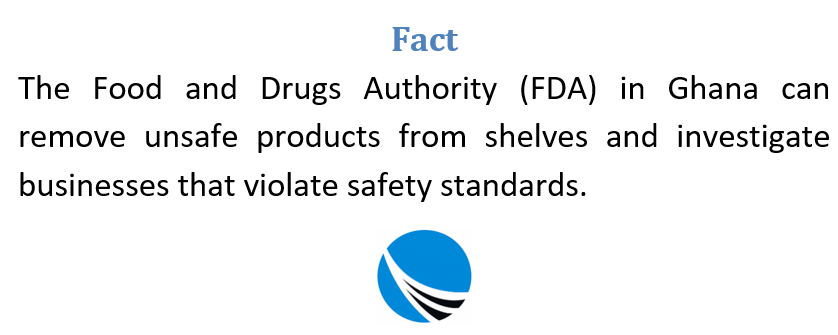In our everyday interactions with goods and services—from buying groceries to subscribing to internet bundles—we take on the role of consumers. But what happens when a product doesn’t meet our expectations, turns out to be faulty, or even causes harm? That’s where consumer rights come in. These rights serve as a safety net, ensuring people are treated fairly, receive good value, and stay protected in the marketplace.

Who Is a Consumer?
A consumer is anyone who uses or buys goods and services for personal use, not for resale. Whether it’s purchasing a loaf of bread or using a ride-hailing service, consumers make daily decisions to meet their needs and wants. Children buying candy, adults paying for electricity, or students subscribing to online learning platforms are all examples of consumer behavior.
The power to choose what to buy, from where, and under what conditions is central to consumer rights. But choice alone isn’t enough—consumers need protection to ensure those choices are meaningful, safe, and respected.
What Are Consumer Rights?
Consumer rights are a collection of entitlements designed to guard buyers against unfair treatment, harmful products, and deceptive business practices. These rights help create trust between buyers and sellers, encourage better products, and empower people to make informed decisions.
Let’s explore some of the key consumer rights:
The Right to Safety
Every consumer has the right to be protected from products that could cause injury or harm. This covers items like food, electronics, and medicine. Products should include clear instructions for safe use and warnings about potential dangers. In Ghana, the Food and Drugs Authority (FDA) plays a major role in ensuring safety by inspecting, testing, and approving food, medicine, and cosmetics before they reach consumers.
The Right to Make Choices
In a fair market, consumers should have access to a variety of goods and services. This right ensures that people can compare prices, quality, and features before making a purchase. Whether it’s choosing between two brands of toothpaste or comparing phone models, consumers should never feel pressured or restricted in their decision-making.
The Right to Seek Redress
Sometimes products fail to perform as advertised, arrive damaged, or fall short of expectations. Consumers have the right to return such items and ask for a repair, replacement, or refund. This right, commonly supported by store return policies and warranty agreements, ensures businesses take responsibility when they fall short.
The Right to Speak Up
If something goes wrong with a product or service, consumers should be able to raise their concerns without fear of being ignored. Businesses are expected to provide proper customer service and respond to feedback constructively. Speaking up helps improve service quality and holds businesses accountable.
The Right to Be Informed
Consumers deserve accurate and complete information before making purchases. Labels should clearly display product contents, expiration dates, and instructions for use. This right also includes transparency in pricing, allowing people to know exactly what they’re paying for and whether a deal is genuine.
The Right to Privacy
When making purchases—especially online—consumers often share personal information. The right to privacy ensures that this data is kept secure and not shared or sold without consent. Companies must handle customer data responsibly and comply with data protection laws.

The Right to Fair Treatment
No consumer should be discriminated against or misled. This right protects individuals from dishonest advertising, false claims, and unfair pricing. Businesses must deal with all customers honestly, regardless of age, gender, background, or income level.
The Right to Learn
Consumer education is critical. Knowing your rights, how to spot fake products, and how to report issues makes you a smarter, safer buyer. Schools, government bodies, and NGOs help teach people—especially young consumers—how to navigate the marketplace confidently.
The Right to a Safe Environment
Clean air, uncontaminated water, and responsible waste disposal affect everyone. Consumers have the right to demand that businesses operate in environmentally friendly ways. This includes reducing pollution, avoiding harmful chemicals, and designing products that don’t harm the planet.
Why Consumer Rights Matter
Consumer rights aren’t just theoretical—they serve real, practical purposes in daily life. Here are some of the reasons why they are essential:

Protection for the Vulnerable
Certain groups—like children, the elderly, or people unfamiliar with legal systems—are more likely to be exploited in markets. Consumer rights help level the playing field and ensure everyone can shop without fear.
Empowerment
When people know their rights, they feel confident making choices. This independence encourages fair competition and pushes businesses to provide better service and value.
Promoting Health and Safety
Strict safety standards, especially for food, medicine, and electronic goods, help prevent illness and injury. Consumer protection ensures companies do not cut corners that could endanger lives.
Encouraging Honest Business Practices
When companies are held accountable, it creates a culture of honesty and reliability. This leads to better service, higher product quality, and more satisfied customers.
Building Trust in the Market
People are more likely to spend money when they feel secure. A strong consumer protection system promotes economic activity by reassuring people that they won’t be cheated or harmed.
Stimulating Competition and Innovation
Companies must innovate and improve their offerings to meet high standards and retain customers. Consumer rights indirectly drive businesses to be more efficient, ethical, and customer-focused.
Consumer Protection: What It Means
While knowing your rights is important, having systems to enforce them is equally crucial. Consumer protection involves laws, institutions, and regulations that make sure these rights are respected and upheld.
Let’s break down what consumer protection looks like in Ghana.
How Ghana Protects Consumers
The Consumer Protection Act (Act 850)
This law outlines the core rights of consumers and obliges businesses to respect them. It offers legal channels for consumers to report issues and seek redress. If a product harms a buyer or a service turns out to be fraudulent, consumers can file complaints or take the matter to court.
Food and Drugs Authority (FDA)
The FDA ensures that food, medicine, and cosmetics meet safety standards. They also conduct public education on product safety and recall dangerous items from stores. The FDA inspects factories, pharmacies, and shops to ensure that unsafe or expired products don’t make it to consumers.
Ghana Standards Authority (GSA)
The GSA develops product standards and certifies items that meet these benchmarks. Their goal is to shield consumers from substandard or fake goods. Labels bearing GSA certification help buyers identify trustworthy products.
Competition and Fair-Trade Commission
This agency ensures businesses don’t manipulate markets through practices like price-fixing, false advertising, or creating monopolies. They foster fairness in business conduct, which benefits both buyers and sellers.
Consumer Protection Agencies and NGOs
Various organisations in Ghana work to promote awareness, resolve disputes, and lobby for stronger consumer protection laws. They run campaigns, educate the public, and offer support to individuals facing unfair treatment.
Advertising Standards Board
This board monitors advertising to ensure that marketing messages are truthful and not misleading. This protects consumers from exaggerated or fake claims that could influence their purchasing decisions.
Bank of Ghana (BoG)
The BoG oversees financial services like banking and microfinance. It ensures these institutions follow fair practices, protect customer deposits, and prevent fraud in financial transactions.
A Real-Life Example
Imagine Atsu, a young boy who saves up to buy a remote-control car. He finds the perfect one, but when he gets home, he discovers it’s broken and missing a remote. His mom takes him back to the store, where the manager listens, apologizes, and offers a refund or replacement. Atsu chooses a new car and learns to check items before leaving the store. This simple story reflects the power of consumer rights and how they work in real life.
Final Thoughts
Consumer rights aren’t just concepts—they impact everyday life. They ensure we’re treated fairly, get value for money, and remain safe when using products and services. In Ghana, laws and institutions support these rights to create a healthier, more trustworthy market environment.
As a consumer, knowing your rights and how to act when they’re violated gives you the power to protect yourself and others. Whether you’re buying bread or booking a flight, your rights matter—and they help build a better society for everyone.
FAQs on Consumer Rights and Protection in Ghana
What is a consumer?
A consumer is anyone who buys or uses goods and services to meet their personal needs and wants, like food, clothes, or transport.

Why are consumer rights important?
They ensure people are treated fairly, stay safe from harmful products, and feel confident when making purchases.
What is the right to safety?
It protects consumers from dangerous or faulty products and ensures items meet safety standards before being sold.
How does the right to choose benefit consumers?
It gives people the freedom to compare and pick the products or services that best suit their needs without being forced.
What does the right to redress mean?
If a product is faulty or disappointing, this right allows consumers to ask for a refund, repair, or replacement.
Why is the right to be informed necessary?
It helps consumers understand what they’re buying by showing correct details like ingredients, pricing, or expiry dates.
What is the right to be heard?
Consumers can raise complaints about bad products or services, and businesses are expected to listen and respond.
How does the right to privacy protect consumers?
It keeps personal information secure and ensures businesses don’t misuse or share your data without permission.
Why is consumer education a right?
Learning about your rights helps you make better decisions, avoid scams, and protect yourself in the market.
What is consumer protection?
It involves laws and agencies that make sure businesses treat customers fairly and sell safe, honest products.
How does the FDA protect consumers in Ghana?
The FDA checks food, medicine, and cosmetics to make sure they are safe and removes harmful ones from the market.
What should consumers do if their rights are violated?
They can report the issue to consumer protection agencies or seek legal action to get a solution and protect others.
